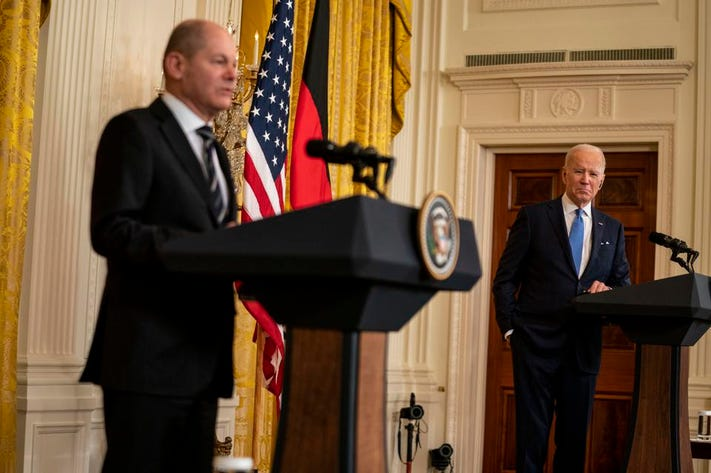Will Biden and Scholz unlock hydrogen potential? – Forbes.
[Forbes] Olaf Scholz, German Chancellor, standing next to President Joe Biden in the East Room of the White House, said,Where gas is being used, we will switch to hydrogen.
“This will be a process that will happen faster than many might imagine, and that will create a bright future for all of us.”
It is a sign of how quickly it has moved up the political agenda that a prominent world leader openly discusses the roll out of hydrogen. Hydrogen also forms an important pillar of the Biden administration’s energy policy with some $8 billion assigned to building hydrogen hubs.
🔥 What about we co-host a webinar? Let's educate, captivate, and convert the hydrogen economy!
Hydrogen Central is the global go-to online magazine for the hydrogen economy, we can help you host impactful webinars that become a global reference on your topic and are an evergreen source of leads. Click here to request more details
Hydrogen has entered the mainstream consciousness and it is encouraging to see Chancellor Scholz talk about it with optimism.
However, our analysis indicates that much more must be done to speed up the scaling of hydrogen, and to think it will happen by itself with the same speed as solar PV and wind dominating power production is a dangerous mistake.
Without any major new policy interventions, we forecast that hydrogen will meet just 5% of global energy demand by 2050. This figure needs to more than double to 13% according to our Pathway to Net-Zero Emissions report, which maps out a feasible way to reaching the Paris climate targets.
As is so often the case when talking about speeding up the energy transition, the key factor is policy. Hydrogen and hydrogen products– often called e-fuels – is a must for sectors such as high-heat industries, aviation and maritime, which cannot be easily greened by direct electrification.
Often referred to as hard-to-abate, these sectors contribute 25% of global emissions and are heavy users of fossil fuels.
The oil thirsty aviation industry consumes 3% of the world’s energy and provides a case study in the limitation of electrification. Norway, for example, aims to electrify all domestic flights by 2040. Batteries, though, might be able to transport passengers between Stavanger and Bergen, but not from Oslo to New York.
Since only a minor part of aviation fuel is consumed on short-haul flights, electricity will represent only 2% of the aviation fuel mix in 2050. The industry is already directing significant resources at sustainable aviation fuels. Airbus, for example, has an ambition to develop the world’s first zero emission aircraft by 2035 using hydrogen.
Shipping is another heavy polluter reshaping how it thinks about energy. The world fleet is mostly powered by diesel engines running on marine fuel oils but there has been an increase in the uptake of alternative fuel in ships on order from 6% in May 2019 to nearly 12% in June 2021.
Except for the electrification underway in the short-sea segment, the alternative fuels are currently still mainly fossil-based and in particular liquefied natural gas (LNG). LNG is less carbon intensive fuel than oil, but more comprehensive decarbonization requires the uptake of hydrogen and ammonia.
The credibility of hydrogen as a decarbonization fuel lies in its production. Blue hydrogen is produced by capturing and storing the carbon from natural gas and green hydrogen is made by using renewable energy to power electrolyzers to split the hydrogen from water.
The blue path requires carbon capture and storage and its use of fossil fuels makes some wary of this form of production. Germany, for example, is reportedly only willing to subsidize green hydrogen.
But if we are to reach net zero by 2050, we need both, even if we at DNV forecast green hydrogen to be the dominant method by the middle of century.
The policy toolkit available to promote hydrogen and reduce the emissions in the hard-to abate sectors is wide. Sustainable aviation fuel blending mandates leading to an increase in plane ticket costs will reduce the number of trips whilst also help funding the transition to low carbon fuels.
A higher carbon price will make hydrogen more competitive. Direct subsidies, like those initiated by Berlin and Washington, are also very effective. It is maybe unfair to class the rhetoric around hydrogen as hype as there is a frenzy of real-world innovation and investment in the hydrogen sector.
But if Chancellor Scholz’s prediction is to be realized, and hydrogen really is closer than we think, they need more of a helping hand (and maybe a stick) from governmental and industry bodies.
READ the latest news shaping the hydrogen market at Hydrogen Central
Will Biden And Scholz Unlock Hydrogen’s Potential?, February 22, 2022








